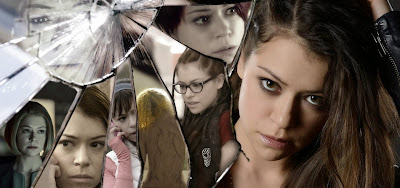Tatiana Maslany plays several women who discover that they are actually clones.
It was a rainy day in March, I was bored, and I wanted something interesting to watch that was not a reality show, nor a documentary, nor one of the overly hyped so-called hits that appear on the major networks. I browsed through the on-demand listings and stumbled upon a series titled Orphan Black which smartly opened with Season 1, episode 1 for those of us who might need catching up. "I'll give it a shot," I thought.
I ended up binge-watching the first four episodes and was then hooked. By the time Season 3 began on BBC America on April 18, 2015, I was quite familiar with the story line and eagerly anticipating its debut.
But, why had none of my geeky sci-fi loving friends ever mentioned the show? Why hadn't I seen any Saturday night post-airing mentions on my social media feeds for hashtag CloneClub?
The show, which is filmed in Toronto Canada, has been slow to take hold here in the U.S., and is often overlooked for critical acclaim, including being passed over twice for a single coveted television Emmy nomination. It has earned a heavy shelf of other awards, however, including: four EWwy's (Entertainment Weekly), a 2014 Gracie, two 2013 Tubey's for most underrated show and best new show, and pretty much cleaned up at the 2nd and 3rd annual Canadian Screen Awards in 2014 and ’15 for best -- you name it. Once a critic takes the time to watch the show, they are captivated and impressed. Now in it's third season, the buzz is finally growing as the 13,000 Facebook-based CloneClub fans and over half a million series fans come out of hiding to show their support.
Orphan Black on facebook and twitter.
CloneClub on facebook.
See Wikipedia for a full list of awards.
Sometimes, a name is to blame.
"Orphan Black" is the codename for a secret military project involving the genetic research of human cloning.
The term "black" in the title refers to a top-secret, covert, private-sector-run, highly-classified military operation. It is an obscure usage of the word "black" to many American audiences who might shy away from it, assuming that it's a racist term. Perhaps this is one of the reasons why the well-executed, thought provoking show has not caught on like wildfire in the U.S, …yet.
In the storyline, two projects were successfully launched about thirty years ago: Project Castor, which created a stronger-than-average breed of loyal, obedient, soldier; and Project Leda, which created a fast-healing, quick-thinking, intelligent female.
Plot in a nutshell
The pilot episode 101, which originally aired on March 30, 2013, introduces us to the lead character, con-man Sarah Manning (played by Tatiana Maslany), who returns to Canada where she discovers by accident that she has a twin she didn't know about. Sarah is leading a troubled life of crime and needs to hide out from her abusive drug dealer boyfriend, Vic (played by Michael Mando). She decides to switch identities with her newfound twin, Elizabeth "Beth" Childs, who has unfortunately just committed suicide, but left behind her purse with ID, a ledger for a healthy savings account, keys to a lovely apartment, and a gorgeous boyfriend Paul (played by Dylan Bruce). While a funeral is held for Sarah, she has no trouble impersonating Beth, even sleeping with Paul and cashing out the bank account, until she discovers that her deceased twin was employed as a police officer who is now under investigation for a serious manslaughter charge.
Over the next few episodes, we are introduced to a dozen Project Leda clones, each uniquely different from the other in personality and lifestyle. We become well-acquainted with the following main female characters:
Allison is the uptight, anal, pill-popping soccer mom married to her high-school sweetheart, Donnie (played by Kristian Bruun).
Helena is the dangerously uninhibited clever sociopath who was raised locked away in a closet in a nunnery in the Ukraine.
Cosima is a brilliant scientist and lesbian who is suffering from a disease which is the result of a flaw in her human-engineered DNA.
Rachel is the "fully aware" clone, raised by the scientists heading project Leda, and is now a bureaucrat who helps run the project.
Sarah, our lead clone character, is a con woman who was raised in the UK, then moved with her foster family to Canada. After having a fight with her stepmother Mrs. "S" (played by Maria Doyle Kennedy) over partying too much, she abandons her young daughter Kira (played by Skyler Wexler) and runs away to live in the UK. After a time, she returns to Canada to reclaim her daughter and join up with her beloved brother Felix (played by Jordan Gavaris), and this is where our adventure begins.
Tatiana Maslany
It would have been easier for the co-creators of the sci-fi drama Orphan Black, writer Graeme Manson and director John Fawcett, to hire a set of twins to play the 11 different adult female clone characters. Instead, they hired Tatiana Maslany (nicknamed Tat), a multi-lingual 29-year old actress from Regina, Canada.
As you watch the show, you quickly forget that Sarah, Cosima, Allison, Helena, and Rachel are all being played by one, and only one, single solitary actress. This differentiation in character portrayals is even more pronounced when one clone masquerades as another, as twins often do. Somehow, Tat manages to pull it off.
Actress Tatiana Maslany said she uses a few different techniques to get in character for each role, including preparing for each part by dancing in her trailer to sound tracks she's customized to match the mood of each personality. She says she waits until she has "transitioned" into the new person before going on set.
As an example, in a recent interview on the Kelly and Michael show (May 13, 2013 video), Tat said she uses the Jurassic Park theme song to prepare to play the voice of Pupok, the scorpion, an imaginary friend and advisor to the psychologically unstable Ukrainian "seestra," Helena.
In addition to having to play several different personalities, Tat also must sometimes act her lines while "pretending that there's a person opposite me, when there often isn't."
Creating an illusion
In order to pull off such an amazing feat of having just one actress play several opposing roles is a sophisticated, well-rehearsed, behind-the-scenes team operating highly technical gadgetry.
In some cases, Tat's primary body double Kathryn Alexandre steps in when the scene involves physical interaction between two or more twins. The scene is shot several times with Kathryn and Tat playing opposite roles, then with Tat playing to an invisible character marked only by a piece of tape or a ball, which is used to help keep her eyes focused on the correct location.
Each time a two-or-more-clone shot is filmed, it's achieved using a device nicknamed the "Time Vampire" which features a camera on a technodolly that memorizes movements and can then repeat them back, so that it is programmed to always follow the exact same track over the exact same period of time. This allows all of the versions of film to line up precisely so that they can be seamlessly edited, creating a believable illusion of multiple actresses. The gizmo is called a time vampire due to the necessity to allow it to run its full course and full length of time with each take.
A video explaining part of the process can be found online on BBCamerica.com.
Director John Fawcett leads the crew. Aaron Morton is in charge of cinematography. The complex task of editing multiple takes of the same scene is completed by D. Gillian Truster, Brett Sullivan, Jay Prychidny, Stephen Lawrence, and Matthew Anas.
Tat's body double Kathryn Alexandre also appears as "Alexis," a member of a dangerous religious cult known as the Proletheans, who are interested in cultivating offspring from the clones.
Project Castor features the male clones, all portrayed by the talented Ari Millen, who plays a prominent role in Seasons 2 and 3. Unlike the clones of Project Leda, the military bred Castors are expected to conform and behave in much the same way as each other.
(Full cast and crew listed on IMDB)
On May 7, 2015, Orphan Black was renewed for ten more episodes in Season 4.
Orphan Black can be seen on BBC America each Saturday at 9:00 p.m. Or, find past episodes on-demand and on itunes.


No comments:
Post a Comment
What's your opinion?